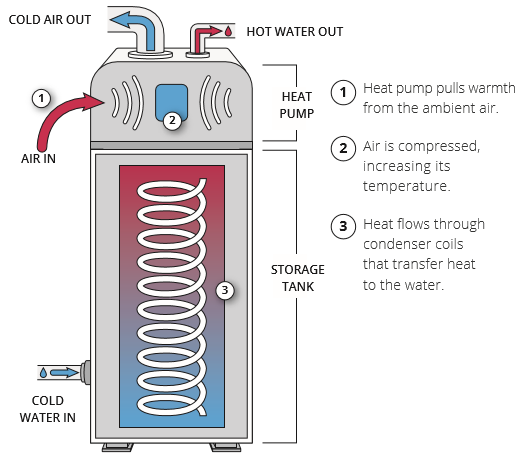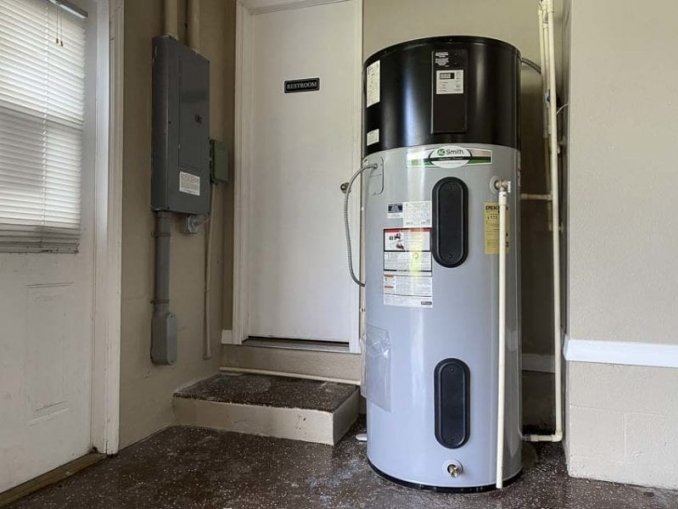Heating water can be costly and space-consuming for small homeowners or apartment dwellers. The majority of homes have a large tankless water heater that heats water as needed and runs continuously to keep the water hot—waste of money and space. Fortunately, a hybrid tankless water heater is now available on the market that combines the best of both worlds to save you money and solve your space issues!
Compared to traditional water heaters, the hybrid tankless water heater has numerous advantages. If you’re thinking about replacing your water heater, keep reading to find out how this cutting-edge appliance can help you save money and space in your home! So, how does a hybrid tankless water heater work?

A Quick Overview of Hybrid Tankless Water Heaters
Hybrid water heaters (HPWHs) have grown in popularity in the United States over the last few decades. And with good reason. Due to its unique design and innovative technology, the hybrid tankless water heater can save homeowners money in the long run, which is one of the most convenient and practical features. As more homeowners learn about the numerous benefits and advantages of this type of water heater over traditional water heaters, such as lower energy costs, lower maintenance needs, higher efficiency, and more, it is becoming increasingly popular.
What Is The Operation Of A Hybrid Water Heater?
Electricity powers a hybrid tankless water heater. Instead of relying on the ambient air, it does not use gas to generate heat. The air enters the coil or converter of the water heater and a hybrid heat the water inside. The hot water runs through the faucets, showers, and other fixtures.
1 – Energy Savings
Like traditional water heaters, this water heater system has a water storage tank. The pump is at the top, and the tank is at the bottom. It has a tank that can hold up to 120 gallons of water.
Whereas traditional water heaters use gas to generate heat, the hybrid water heater uses heat from the environment. This method increases the system’s efficiency by two to three times standard water heaters. As a result, it is the most environmentally friendly and energy-efficient option.
2 – Simple to Move
These appliances work best in warmer climates because they use ambient air. Also, make sure it’s in a room with plenty of space. Install it in an area with a minimum of 1000 cubic feet of available air. A hybrid water heater requires ventilation to remove air from the environment. It also boosts their productivity. Because these water heaters are smaller, they are easier to transport.
These systems also have a venting system to prevent heat loss. As a result, your water will stay warm for longer. You can also change the temperature settings using a digital touchpad. Because it pre-stores water in a tank, it maintains a consistent flow of hot water.
3 – Boost Electricity Savings
Furthermore, it is simple to install and does not require additional circuit components. It also makes it possible to save up to 90% on electricity. In terms of numbers, it can save up to $330 per year or $3500 throughout its lifetime. It has high upfront and installation costs, but it pays for itself in less than two years.
A water softener is required for a few water heaters. Hybrid water heaters do not require any additional equipment.
Features of a Hybrid Water Heater (Heat Pump Water Heater)

Foremost, consider are hybrid electric water heaters worth it? Heat pump water heaters, also known as hybrid water heaters, use heat from the surrounding air rather than electricity or gas to heat the water. “Hybrids work like a refrigerator in reverse,” according to Department of Energy researchers. A stand-alone air-source hybrid water heater pulls heat from the surrounding air and dumps it — at a higher temperature — into a tank to heat water, similar to how a refrigerator pulls heat from inside a box and dumps it into the surrounding room.”
Today’s hybrid water heaters include a backup electric resistance heater if the ambient air temperature isn’t warm enough. That is why they are referred to as hybrid heat pumps. It must install hybrid water heaters in an area of your home where the temperature stays between 40o and 90oF (4.4o–32.2oC) all year. To function, they require at least 1,000 cubic feet (28.3 cubic meters) of air space around the water heater.
Heat pump water heaters cost about $800 more than the cheapest electric water heaters. Does it raise the question, are hybrid electric water heaters worth it?
1 – Operating Costs are Much Lower
It’s important to consider the annual operating cost of a water heater and the upfront cost. Water heaters consume roughly 20% of your home’s total energy. Considering that the average homeowner spends between $1,500 and 2,500 on energy, each year adds up. Heat pump water heaters are typically four times more efficient than electric water heaters. The average family will save $300-400 per year.
Another way, a hybrid heat pump will pay for itself in two or three years. It will save you between $3,000 and $4,000 over ten years. Not bad.
2 – Reduce Your Carbon Footprint
The lowest carbon footprint of heat pump water heaters is the most appealing feature. Heat pumps are the most energy-efficient water heater available, aside from solar water heaters, which are still prohibitively expensive in most United States.
The average heat pump water heater emits 4x fewer emissions than traditional electric models due to their high energy efficiency.
3 – More environmentally friendly and energy-efficient.
Heat pump water heaters are currently the most energy-efficient option available. They use far less energy and emit fewer greenhouse gases than gas water heaters.
Natural gas prices have recently risen, indicating that fuel is no longer a viable home energy source. According to experts, natural gas prices are expected to rise by up to 50% this winter.
4 – Extended warranty
Most hybrid water heaters have a longer warranty than standard electric water heaters. The warranties are also significantly longer than those offered by the best tankless water heaters. Rheem electric water heaters, for example, have a 6-year warranty on the base models, such as the Rheem 18kW 240V. A 9-year warranty will set you back another $100. The hybrid water heater, such as the Ruud 65 Gal EF3.5, has a 10-year warranty.
5 – Installation
The installation process is one of the most important factors influencing your decision. Hybrid water heaters are just like standard electric water heaters in the installation. They’re more energy-efficient versions of the standard water heater you’ve probably seen your entire life.
Pros and Cons of Hybrid Water Heaters
Pros:
- It is long-term.
- Tax benefits are associated with it.
- Extremely long-lasting. It has a 20-year lifespan.
- It is ideal for larger homes because of its compact size.
- Low utility bills result from these appliances.
- They can mount it on exterior walls or in nooks and crannies.
Cons:
- It has high upfront and installation costs but lower ongoing costs.
- Because there is no tank, heating water may take longer.
- If a family uses a lot of hot water daily, multiple tankless water heaters may be required.
Are You Interested In A Hybrid Electric Water Heater?
An electric hybrid heat pump will save you the most money if you live in a hotter climate and use electricity to heat your water. It will still save money in colder climates during the summer when you are not paying to heat the surrounding air. The faster the payback, the higher your electric rates and the warmer your year-round climate are. The payback period can be as short as four years most times.
Conclusion
In the United States, it has introduced a new hybrid tankless water heater, promising to save users money while taking up less space than a traditional tankless model. One issue with tankless water heaters is that many are quite large, leaving little room in your home for other things. This new hybrid combines the technology of tankless water heaters with the heating system found in tank models, resulting in a significantly smaller and more efficient unit than most other types currently on the market.
Frequently Asked Question
A: A hybrid may be the best option if you only have electric access to your water heater and the space is open. A tankless water heater is usually preferable for gas fuel, a smaller area, and saving water.
A: Yes, even in cold climates, today’s heat pump water heaters are efficient. Heat pump water heaters (also known as “electric hybrid”) work best in rooms with a constant temperature of 40°F or higher.
A: Efficiency over time Fuel, oil, and electric water heaters are all inefficient, but hybrid water heaters are the most efficient. Hybrid water heaters hold a lot of promise for those looking for a water heater that is both energy and cost-effective.
- Upgrade to a 50-gallon hybrid water heater if you have a 30-gallon water heater.
- Upgrade to a 65-gallon hybrid water heater if you have a 40-gallon water heater.
- If your water heater is 50 gallons, upgrade to an 85 gallons hybrid water heater.
